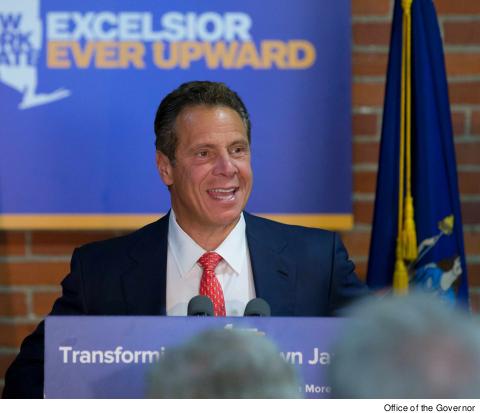Act has bipartisan support
 |
As the academic year and legislative session came to a close, the state’s public higher education advocates welcomed a significant boost from the State Legislature. Both the Democrat-controlled State Assembly and the Republican-controlled State Senate passed the Maintenance of Effort (MOE) bill, which would require each annual New York State budget to include funds for CUNY and SUNY to cover the inflationary increases of operating costs at the four-year colleges such as rent, energy and contractual salary increases. It would ensure that CUNY and SUNY have funds to maintain academic and other services at prior-year levels without cuts caused by mandatory cost increases.
GEARING UP
State underfunding of the public university systems in New York over the last several years has led to tuition increases for students and persistent cuts to academic programs. The PSC, along with NYSUT, student groups and the academic union at SUNY, United University Professions, is gearing up for an intense, short-term campaign to demand that Governor Andrew Cuomo sign the popular and beneficial piece of legislation into law.
The governor has until the end of the year to sign or veto the bill, but he may request that it come to his desk any time before then. His approval is far from assured, however, despite the bill’s widespread bipartisan support. Governor Cuomo vetoed similar legislation in 2015 and attempted to cut CUNY’s budget by nearly a half-billion dollars in 2016.
But this year, Cuomo has positioned himself as a champion of higher education with the Excelsior Scholarship program, which increases tuition-free opportunities at both SUNY and CUNY. Critics of the program have shown that the coverage is less expansive than the governor advertised.
PSC Vice President Mike Fabricant commented that the governor’s focus on affordability for public higher education is laudable, but impossible without addressing funding. “Access to a starved university is a false promise,” Fabricant said.
Fabricant continued, “The Excelsior Scholarship, at best, provides greater affordability for groups of people who may otherwise find college unaffordable. If you’re going to focus on affordability, you have to focus on quality. They’re twin issues. You can’t admit thousands of new students and not have thousands of new faculty, counselors and support staff.”
ENDING THE ‘DANCE’
The MOE bill would begin restoration of CUNY and SUNY’s financial health by ensuring that the actual, inflation-adjusted cost of operating the four-year colleges in each system is met each year. The bill would end the “budget dance” in which every year’s initial budget represents a real-dollar cut from the year before, and advocates are forced to spend their energy simply restoring what was cut. While the bill does not address community college funding, it would relieve the biggest shortfall in CUNY’s total budget.
As PSC President Barbara Bowen said in City Council testimony earlier this year, the state MOE bill “would gradually but profoundly transform the fiscal condition of the university.” CUNY would no longer have to start from an already cash-starved position at the beginning of each budget cycle.
GAME-CHANGER
Bowen and other public higher education advocates have made clear that the money allocated in this bill would be game-changing. “If the legislation were in place now, CUNY senior colleges would have $157 million more in state funding this year alone,” she said. “Each subsequent year new funds would be added to cover mandatory costs, and the spiral of budget reductions would stop.”
Specifically, the bill would fund collective bargaining increases and close the gap between the highest TAP award and the actual cost of CUNY tuition. Closing the “TAP gap” alone would have saved CUNY $91 million this year. The bill would also fund cost increases for non-negotiable expenses, such as rent and electricity. CUNY has relied on tuition increases to fund these day-to-day costs; the bill, if enacted, would help to eliminate the need for tuition increases to cover such expenses in the future.
State Assembly Higher Education Committee Chair Deborah Glick, a cosponsor of the bill, said in an interview with Spectrum News that the governor should sign the bill as a way to augment the positive impact of the Excelsior Scholarship on college affordability for students. She said the bill would “ensure the state does its part, not just for this direct aid to students, but also support for the institutions on the vagaries of their costs, utility costs, cost of contracts and some ancillary costs over which they have little control, and that’s where the state has not necessarily always been forthcoming.”
Fabricant added, “The campaign now is to send this message to the governor: funding for public higher education is vital; it’s doable and it’s necessary for a progressive state like New York.”
That campaign is already underway, as several hundred students have signed a petition organized by the SUNY Student Association directed at the governor, demanding he sign the bill. “Students are not bottomless ATMs that can be exploited for more cash when the state runs low and fails to live up to its obligation to support public education again and again,” an online letter with the petition reads. “Students have and continue to pay more than their fair share and the State of New York must now make up for six years of underfunding mandatory costs at CUNY and SUNY.”
THE ROAD AHEAD
With only a few months to build pressure for the governor’s signature, PSC members can expect to be called on to push hard for the bill. “This is a rare opportunity to make a permanent change in CUNY funding,” Bowen said. “We will need every PSC member and every CUNY and SUNY student to let the governor know that progressive leadership in higher education means funding, not just access.” PSC members can start by signing the students’ petition, which is open to all.

